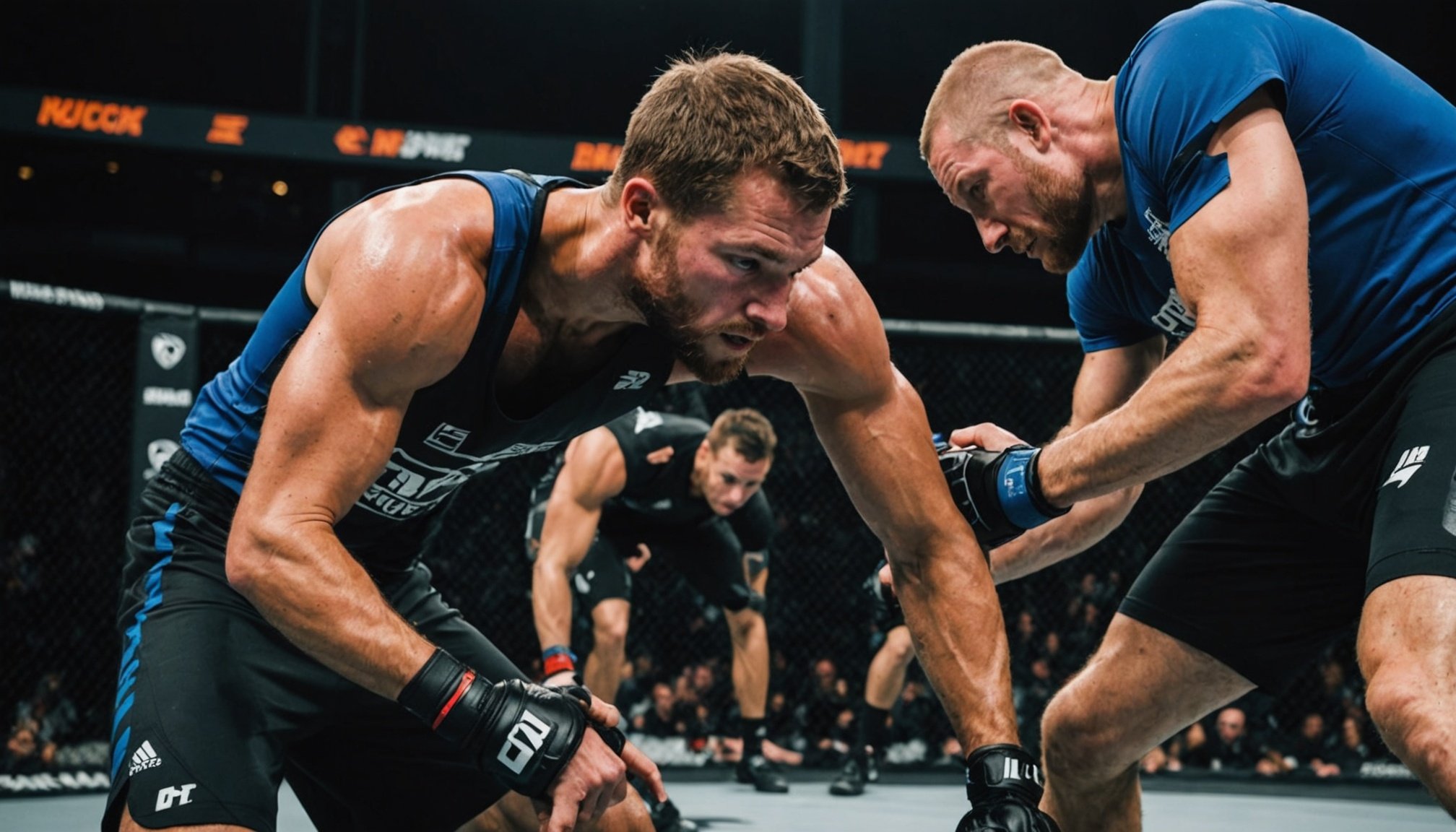Understanding Performance Anxiety in Combat Sports
Performance anxiety is a common issue faced by athletes, particularly in combat sports. It refers to the overwhelming sense of nervousness or fear before or during a performance, often triggered by the pressure to succeed or fear of failure. This anxiety can stem from various sources, such as high expectations, past failures, or intense competition.
The impact of performance anxiety often transcends physical performance, influencing not just the outcome of a match but also an athlete’s mental well-being. Athletes experiencing heightened anxiety may suffer from self-doubt, reduced concentration, and loss of focus, ultimately affecting their performance and outcomes negatively. For combat sports players, these mental blocks can lead to hesitations or strategic errors during critical moments.
Have you seen this : Harnessing mindfulness for peak performance: elevating uk combat sports athletes” competitive edge
Psychological effects on UK combat sports athletes are significant, with many reporting heightened stress and anxiety levels before competitions. This can lead to a vicious cycle, where ongoing anxiety affects performance, which further elevates anxiety levels. It’s crucial for these athletes to develop mental toughness to manage their emotions and maintain their focus.
Developing strategies to address performance anxiety is essential for combat sports athletes to enhance performance and achieve their full potential. Addressing these psychological aspects can empower athletes to perform at their best under pressure.
In the same genre : Revolutionizing UK Fighters’ Defense: The Impact of Biomechanics on Training Mastery
Proven Strategies for Mastering Mental Grit
Developing mental grit is essential for combat athletes to thrive under high-stress conditions. Building resilience involves adopting coping strategies that enable athletes to navigate challenging situations effectively. Mental grit serves as the foundation of perseverance and mental endurance, crucial for consistent performance in combat sports.
Techniques to cultivate resilience include setting realistic goals, maintaining a positive mindset, and practising adaptability. Athletes should regularly engage in activities that challenge their mental limits, fostering a greater capacity to withstand pressure. Mental toughness can be enhanced through deliberate practice, focusing on improving specific skills under stress.
Practical exercises are integral to enhancing mental toughness. Visualisation techniques, for example, allow athletes to rehearse and mentally prepare for competitions. Regular engagement in mindfulness practices, such as meditation or focused breathing exercises, helps athletes maintain composure amidst tension.
Incorporating routine into training is beneficial for mental fortitude. Structured schedules create stability, allowing athletes to anticipate and manage anxiety more effectively. This includes incorporating rituals that promote focus before competitions.
These strategies collectively enhance an athlete’s ability to cope with competition stress, equipping them with the resilience needed for peak performance. Resilience and mental toughness are not innate but can be cultivated through consistent practices and effective coping strategies.
Psychological Insights from Experts
Understanding psychological insights can profoundly influence athletes in combat sports. Sport psychologists highlight the importance of mental preparation techniques to enhance performance and address anxiety effectively. By developing mental strategies, athletes can manage stress and maintain focus during high-pressure events.
One core aspect is visualization and mental rehearsal, which equip athletes with a mental framework for competitions. This practice involves mentally simulating a fight, allowing athletes to perform optimally by anticipating various scenarios and responses. Visualization helps in building confidence and reducing anxiety, as athletes feel more prepared for potential challenges.
Additionally, integrating routine and rituals into training solidifies mental strength. Consistent rituals before competitions, such as specific warm-ups or relaxation techniques, cultivate a sense of familiarity and control. These practices anchor athletes emotionally, providing a calming effect that mitigates performance anxiety.
Experts assert that adopting structured routines helps athletes maintain emotional balance and focus. Successful athletes often rely on repetitive pre-competition routines to feel grounded and confident. Such rituals become essential components of their mental training regime, ensuring readiness and resilience.
Incorporating these expert insights into practice provides athletes with a psychological edge, fostering stronger mental fortitude and performance consistency in combat sports.
Case Studies from UK Combat Sports Athletes
In the world of combat sports, real-life stories from athletes provide invaluable insights into overcoming challenges like performance anxiety. Top UK athletes have shared their journeys, revealing personal strategies that led to success. These case studies showcase the power of resilience and mental toughness developed through experience.
Personal experiences highlight the transformative potential of mental preparation. Many athletes emphasize the importance of visualization, as this technique allows them to mentally simulate scenarios they might face during competition. This rehearsal builds confidence and reduces anxiety by familiarizing them with potential challenges.
Athlete testimonials often centre around lessons learned from both successes and failures. For instance, overcoming a devastating loss was a turning point for several athletes, who viewed it as an opportunity for growth. They applied mental grit and determination to rebound stronger, teaching them the importance of resilience.
These stories also underscore the value of continuous self-improvement. Athletes frequently mention adapting new coping strategies to handle stress better. By learning from each other, they foster a community of shared knowledge and encouragement. These insights demonstrate that success in combat sports is not just about physical prowess but also mastering mental challenges.
Techniques for Managing Competition Stress
Successfully managing competition stress is essential for combat sports athletes aiming for peak performance. Effective anxiety management involves employing robust coping techniques that address both the mind and body. Combat athletes must refine these strategies to ensure composure under pressure.
Firstly, incorporating structured routines can significantly reduce pre-competition stress. Regular practices create familiarity and predictability, reducing anxiety levels. Athletes often benefit from personalized rituals, like specific warm-up routines, that instill confidence and a sense of control.
Breathing techniques and mindful practices are powerful tools for managing stress. Athletes can engage in focused breathing exercises to stabilize their heart rate and cultivate a sense of calm. Mindfulness practices such as meditation further assist in centering the mind, maintaining focus, and reducing anxiety before and during competitions.
The integration of physical conditioning with mental preparation is equally important. Ensuring optimal physical fitness enhances an athlete’s confidence in their abilities, which in turn reduces anxiety. Combined, these preparatory methods create a balanced approach to managing stress.
In summary, effectively managing competition stress demands a combination of physical, mental, and emotional strategies. By refining these techniques, athletes can enhance their resilience, allowing them to perform sustainably under high-pressure conditions.
Building a Support System
Establishing a robust support system is pivotal for athletes striving for mental grit in combat sports. Coaches and mentors play a crucial role, not only in skill development but also in nurturing athletes’ psychological resilience. Their guidance fosters a trusting relationship, essential for unlocking an athlete’s full potential.
The presence of coaches and mentors contributes to an athlete’s confidence and mental toughness by providing tailored feedback and motivational encouragement. This dynamic helps athletes navigate challenges and maintain mental stamina. Coaches often design specific training regimens that incorporate both physical and psychological development.
Peer support and camaraderie significantly influence an athlete’s mental state during training. Engaging in a supportive community allows athletes to share experiences and coping strategies. This collective encouragement aids in alleviating performance anxiety, leading to more harmonious team dynamics. Recognizing the achievements and struggles of peers fosters an inclusive and motivating environment.
Creating a positive training atmosphere involves establishing clear communication channels between athletes, coaches, and peers. Building an environment where feedback is constructive and focused on growth encourages mental fortitude. Such spaces empower athletes to openly express concerns, which can be crucial in competitively stressful scenarios. This nurturing ecosystem forms the backbone of an effective support system.






